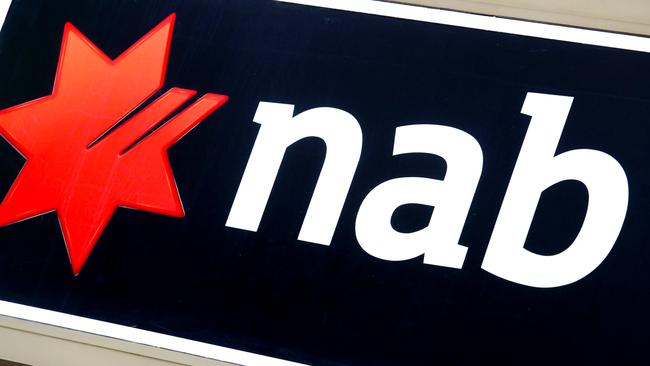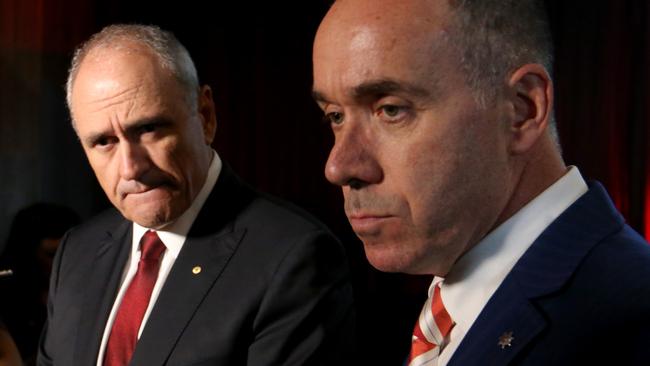Commissioner Kenneth Hayne singles out NAB in scathing royal commission report
His fiery appearance during hearings was among the most memorable moments of the royal commission, now Ken Henry has been singled out in the final report.

Banking
Don't miss out on the headlines from Banking. Followed categories will be added to My News.
The banking royal commission’s final report has singled out one of the big four banks for failing to learn from its misconduct.
Commissioner Kenneth Hayne grilled the CEOs of Australia’s five largest banks as his public hearings drew to a close last year, to gauge their response to the issues his inquiry had uncovered.
“Most professed to having learned from what had happened and proffered their ideas about causes and responses. But the nature and extent of their engagement with the issues differed rather more markedly than I had expected,” Mr Hayne wrote in the report.
“It seemed to me that there remain elements of unwillingness to recognise, and to accept responsibility for, poor conduct of the kinds examined in this inquiry.
“There remains a reluctance in some entities to form and then to give practical effect to their understanding of what is ethical, of what is efficient, honest and fair, of what is the ‘right’ thing to do. Instead, the entity contents itself with statements of purpose, vision or values.”
READ MORE: Scathing report reveals shock extent of deception
READ MORE: Fee rort sparks criminal referrals
READ MORE: NAB chairman Ken Henry fires up at royal commission
Mr Hayne said the CEOs of ANZ and the Commonwealth Bank were both “well aware of the size and nature of the tasks” ahead of them.
He expressed more scepticism about Westpac’s claim it has sought to “reset” its relationship with the regulator, ASIC.
But Mr Hayne reserved particular scorn for NAB, saying it “stands apart” from the other three major banks, and taking aim at its CEO Andrew Thorburn and Chair Ken Henry.

“Having heard from both the CEO, Mr Thorburn, and the Chair, Dr Henry, I am not as confident as I would wish to be that the lessons of the past have been learned,” he said.
“More particularly, I was not persuaded that NAB is willing to accept the necessary responsibility for deciding, for itself, what is the right thing to do, and then having its staff act accordingly.
“I thought it telling that Mr Thorburn treated all issues of fees for no service as nothing more than carelessness combined with system deficiencies when the total amount to be repaid by NAB and NULIS on this account is likely to be more than $100 million.
“I thought it telling that in the very week that NAB’s CEO and Chair were to give evidence before the commission, one of its staff should be emailing bankers urging them to sell at least five mortgages each before Christmas.
“Overall, my fear — that there may be a wide gap between the public face NAB seeks to show and what it does in practice — remains.”
Dr Henry fired up during his appearance before the royal commission in November, visibly bristling at the line of questioning he faced from senior counsel assisting the commission Rowena Orr.
He repeatedly scoffed at Ms Orr’s statements and audibly sighed before answering most of her questions.
In one particularly heated exchange, Ms Orr asked Dr Henry whether NAB’s board should have stepped in earlier after customers were charged fees for no service.
“I wish we had. Let me put it that way. I wish we had — I still don’t know,” Dr Henry began.
“I would like you to answer my question Dr Henry,” Ms Orr interjected. “Do you accept that the board should have stepped in earlier?”
“I have answered the question how I can answer the question,” Dr Henry replied, to which Ms Orr retorted: “I’m sorry, is it a yes or a no, Dr Henry?”
“I’ve answered the question the way I choose to answer the question,” Dr Henry said.
“Well I would like you to answer my question. Do you accept that the board should have stepped in earlier?” she shot back.
“I wish we had,” he said.
“I’m going to take that as a yes, Dr Henry?” Ms Orr concluded.
“Well, you take that as a yes, all right,” Dr Henry replied.
Social media erupted in response to the exchange, labelling it a “shocking moment of disrespect” from Dr Henry.

The royal commission’s final report also focused heavily on the fees for no service issue, singling out Mr Thorburn for seeking to portray the fees as a product of “professional negligence”.
“In many cases the fees for no service issue was in large part a product of poor IT infrastructure … and legacy system issues,” Mr Thorburn told the commission.
“I cannot and do not accept this,” Mr Hayne said in the report.
“As I put to Mr Thorburn, his proposition was that ‘this money fell into the pocket of NAB accidentally’. Mr Thornburn’s frank, and inevitable response was: ‘I can’t disagree with that … it wasn’t intended to be ours but it became ours.’
“The amounts of money that just ‘fell into the pocket’ of so many large and sophisticated financial entities, the number of times it happened, and the many years over which it happened, show that it cannot be swept aside as no more than bumbling incompetence or the product of poor computer systems.”
NAB was heavily criticised again in the section of the report that examined problems with the governance of Australia’s banks.
Mr Hayne delivered a withering assessment of NAB’s conduct in relation to the charging of adviser service fees to members of superannuation funds.
When the issues with these fees were brought to the board’s attention in 2015, it “did not do enough to impress upon management the importance of getting the issue resolved,” the commissioner said.
Instead, NAB spent years locked in negotiations with ASIC, repeatedly making proposals about how it would investigate the issues and compensate members — proposals that were deemed “unacceptable”.
Meanwhile, the bank was not remediating its customers.
As late as November 2018, it had still not agreed with ASIC on what it would do for some customers.
Mr Hayne said it was an example of the sort of poor governance that plagued the sector.
“When management is acting in a way that is delaying the remediation of customers, and damaging the bank’s relationship with regulators, it is appropriate for the board to intervene and say, ‘Enough is enough. Fix this, and fix it now,’” he said.
Originally published as Commissioner Kenneth Hayne singles out NAB in scathing royal commission report


